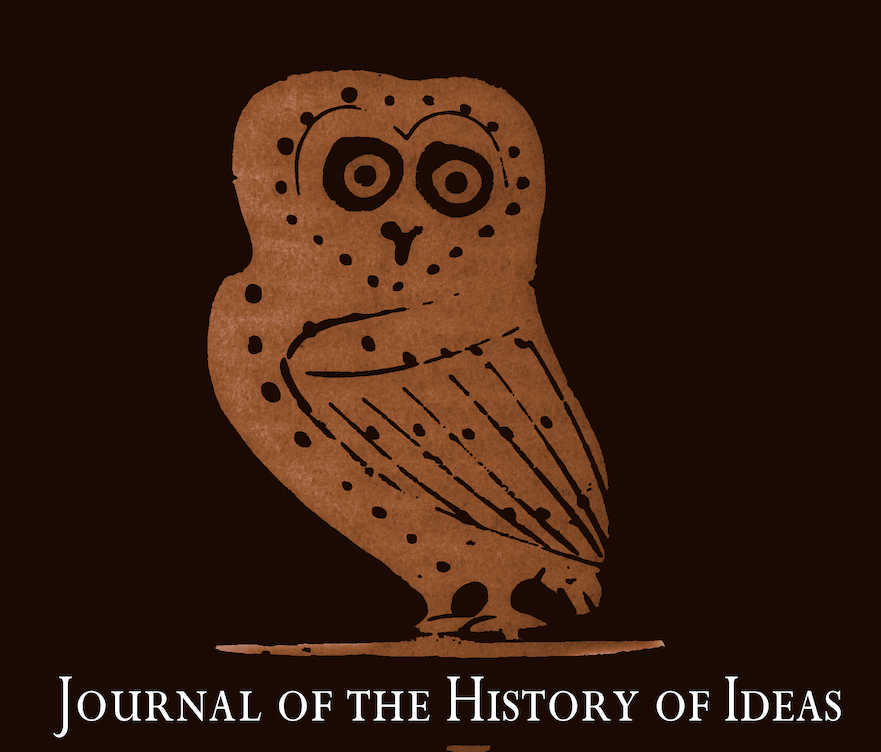Full articles for this season’s Journal of the History of Ideas available through Project Muse
[mc4wp_form id=”12317″]
Value, Justice, and Presumption in the Late Scholastic Controversy over Price Regulation
Andreas Blank
In the sixteenth and early seventeenth centuries, theories of price regulation were developed in order to analyze the demands of justice in situations where markets cease to function—be it through natural conditions, wars, or artificially induced shortages in supply. This article investigates the relevance of the methodological notion of presumption for the legally binding power of laws concerning price regulation. In particular, the relation between presumptions (assumptions that are taken to be true unless and until proven false), the cost-and-labor theory of value, and the question of the morally binding power of laws concerning legal prices are explored.
The Language of “Political Science” in Early Modern Europe
Sophie Smith
Historians of early modern “scientia civilis” focus on two main understandings of that concept: the juridical and the rhetorical. This article focuses on another way of thinking about civil science in the early modern period, the origins and development of which are in the Aristotelian commentary tradition. This article begins with political science in Aristotle then turns to the works of commentators from Albert the Great in the thirteenth century, to the Oxford philosopher John Case in the late sixteenth. It ends on ways that this history offers new perspectives on Hobbes’s science of politics, and on the broader historiography.
Feminism and Natural Right in François Poulain de la Barre and Gabrielle Suchon
Rebecca Wilkin
I compare the notion of natural right in the work of François Poulain de la Barre and Gabrielle Suchon. Poulain defined right in terms of possession like Grotius, Hobbes, and Locke, but limited the equality it established between men and women to private spaces beyond the state’s gaze. Suchon gave the natural right of freedom strong impetus by grounding it in Aristotelian teleology, but this framework made it a dead letter for the Enlightenment. This analysis demonstrates the importance of early modern feminist philosophy to seventeenth- and eighteenth-century political philosophy as well as to present-day discussions of human rights.
The Construction of the Concepts “Democracy” and “Republic” in Arabic in the Eastern and Southern Mediterranean, 1798–1878
Wael Abu Uksa
This article illuminates the construction of the concepts “democracy” and “republic” in the Arabic-speaking regions of the eastern and southern Mediterranean between 1798 and 1878. Examining these ideas through conceptual analysis on two levels, language construction and political discourse, the article reveals the layers these concepts acquired and their reception in the context of state reforms in the Ottoman Empire. While both “democracy” and “republic” evolved in Arabic after the French Revolution and acquired their modern morphological forms and content primarily between the 1820s and 1876, “republic” came into use and was perceived as relevant to local circumstances earlier than “democracy.”
The Creuzerstreit and Hegel’s Philosophy of History
Nicholas A. Germana
Jon Stewart has recently argued that Hegel’s defense of Friedrich Creuzer’s controversial Symbolik should give us pause to reconsider the widely held view of Hegel’s philosophy as racist and Eurocentric. More attention needs to be paid, however, to the strategy that Hegel employs in this defense. This article argues for the influence of Aristotle’s theory of epigenesis on Hegel’s philosophy of nature as well as his understanding of the stages of world-historical development. This Aristotelian understanding privileges the masculine West in relation to the feminine East that provides the material but not the vital efficient cause that animates Greek culture.
Scrutiny’s Virtue: Leavis, MacIntyre, and the Case for Tradition
Paul Andrew Woodridge
Scrutiny(1932-1953) was undoubtedly one of the most important critical reviews of the last century. Its editors and contributors included F. R. Leavis, Q. D. Leavis, Denys Thompson, L. C. Knights, D. W. Harding, and W. H. Mellers, among others. In recasting Scrutiny’s critique of mass culture by way of Alisdair MacIntyre’s After Virtue (1981), I hope to show that the Scrutiny project not only dramatizes the conflicts internal to emotivism, but also opens the way to a practice of criticism with deep ties in a communitarian rather than socialist politics.




Leave a Reply